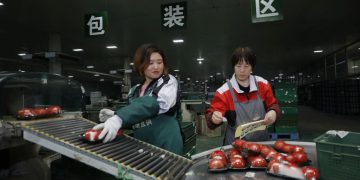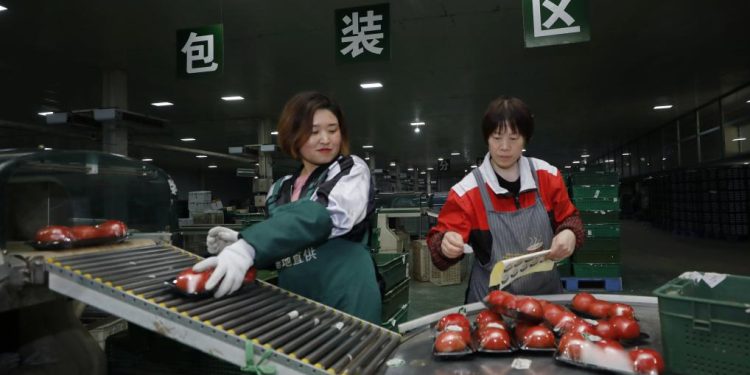In recent years, Hebei province has seized the opportunities presented by the coordinated development of the Beijing-Tianjin-Hebei region. This has led to the integration of “Hebei Clean Vegetables” into Beijing’s food scene, with significant market penetration in the capital’s supermarkets, canteens, and communities. The modernization of the vegetable industry, centered around clean vegetable processing, has seen major products from Hebei capturing more than 40% of the market share in Beijing, thereby diversifying the food options available to Beijing residents and bolstering the income of Hebei farmers.
Spring Festival, traditionally a period of agricultural downtime, finds members of the New Farmer Sweet Potato Planting Cooperative in Dongming Village, Xinle City, diligently tending to their crops. Despite the festivities, they are busy fulfilling orders and expanding sweet potato cultivation to meet post-holiday demand for vegetables. This proactive approach ensures a steady vegetable supply during critical periods, with significant orders coming in from Beijing, demonstrating the importance of maintaining robust agricultural output to meet urban demand.
Ensuring the quality of clean vegetables begins at the source. In recent years, leveraging the opportunities presented by regional collaboration, cooperatives like the one led by Jia Shuancheng have partnered with institutions such as China Agricultural University and the Hebei Academy of Agriculture and Forestry Sciences to introduce high-yielding, superior-tasting varieties. These efforts have significantly enhanced both the yield and quality of sweet potatoes, resulting in a supply that cannot keep up with demand in the Beijing market.
In Gur’an County, the Shunzhai Melon and Vegetable Planting Professional Cooperative transports fresh vegetables to its processing workshop. Through standardized processes such as cleaning, disinfection, cutting, and packaging, these vegetables are transformed into meticulously packaged “fresh-cut clean vegetables.” With most of these vegetables destined for Beijing, the cooperative has maintained consistent sales over the years, providing employment opportunities within the village.
As one of the key production bases for Beijing’s “vegetable basket,” this cooperative supplies over 30,000 tons of premium vegetables to the Beijing market annually, with over 90% undergoing processing to become clean vegetables. In anticipation of increasing demand, the cooperative has invested over 30 million yuan to expand its high-end vegetable facilities by over 200 acres. Additionally, a vegetable processing workshop spanning 10,000 square meters is nearing completion, expected to increase annual clean vegetable production capacity by approximately 20,000 tons.
To meet Beijing’s stringent standards for vegetable products, the cooperative has collaborated with institutions such as the Beijing Academy of Agricultural and Forestry Sciences and the Hebei Academy of Agriculture and Forestry Sciences. By addressing issues such as wilting and discoloration in leafy vegetables during processing, the cooperative continuously improves processing techniques, effectively extending the shelf life of vegetables and enhancing the quality of clean vegetables.
Previously, vegetable wholesalers would collect produce, resulting in extended transportation times that compromised freshness. Now, with dedicated logistics and distribution vehicles, transportation efficiency and product quality are ensured. In Ningjin County, Zhai Xiaolong drives a refrigerated truck from the Ruiqing Edible Fungi Planting Professional Cooperative directly to Beijing’s Xinfadi Market. With new equipment featuring temperature control panels in the driver’s cab, maintaining optimal conditions during transportation has become more manageable, ensuring that vegetables reach consumers’ tables in peak condition.
Infrastructure improvements and optimized transportation routes have further streamlined the transportation of clean vegetables. Local authorities in Ningjin County have prioritized the main transportation routes and peak hours for vegetable transportation, deploying law enforcement officers for routine inspections to create a smooth, efficient, and safe transportation channel for clean vegetables heading to Beijing. Moreover, thanks to the collaborative efforts between Beijing and Hebei, the “Hebei Clean Vegetables” direct-to-Beijing initiative ensures that vegetables travel from Hebei’s fields to Beijing consumers’ tables in under 24 hours.
Efforts to facilitate direct procurement by enterprises and supermarkets from both regions, along with addressing challenges in terminal sales network platforms, are underway. These initiatives not only ensure fresh and flavorful vegetables for Beijing residents but also provide a steady market for Hebei farmers, contributing to mutual benefits for both regions.
The success story of “Hebei Clean Vegetables” illustrates the transformative power of regional cooperation and modern agricultural practices. By prioritizing quality, efficiency, and innovation, Hebei has not only enriched Beijing’s food supply but also empowered local farmers, signaling a promising future for sustainable agriculture and economic development in the region.































